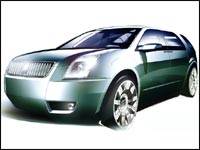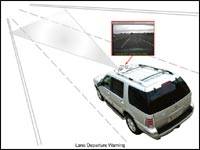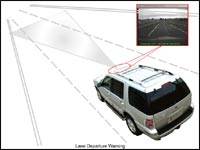With seatbeltsand airbags in virtually every car on the road today and the crash fatalityrate staying pretty much flat for the past few years, it's becoming clear thatthere isn't much more the car companies can do to help people survive crashes.
So the smart carcompanies are now looking for new technologies to stop crashes from happening, orat least reduce their severity, and that's what the Mercury Meta One conceptcar is about.
Ford says the MercuryMeta One will be the ''most advanced scientific research concept ever displayedat an auto show'' when it debuts at the Detroit
Meta One's keytechnologies will be technologies that warn the driver when the vehicle wandersinto another lane, and will apply the brakes if an accident is imminent.
These deviceshave been favorite topics of car companies and major parts suppliers for years,but it's always good to see a firm as big as Ford trying to bring them tomarket.
Ford calls LaneDeparture Warning, and Collision Mitigation by Braking ''active safetytechnologies with promise,'' and it's hard to argue that.
Ford's LaneDeparture Warning is a mechanized vision system designed to recognize lanemarkings and a vehicle's position in relation to those markings, which for themost part is supposed to be between them on the right side of the road.
It can provide avisual, audible and/or ''haptic'' (vibrating) warning to the driver ''if thevehicle departs from a distinguishable travel lane without activation of theappropriate turn signal.''
In the MercuryMeta One concept car, a right lane departure triggers a vibration to the rightside of the seat, while a left lane departure spurs vibration of the left sideof the seat.
In LaneDeparture Warning, vehicle position is evaluated by a camera system mountedbehind the windshield that measures the lateral distance from the camera'scenter line to the left and right lane markings, and the system works day or atnight.
Naturally, thesystem does not warn the driver if the turn signals are used before changinglanes. The system is still under development for conditions without clear lanemarkings (that would be snow-covered roads, a major issue in most ofCanada
Working with itsVolvo subsidiary, Ford also created Mercury Meta One's Collision Mitigation byBraking system to demonstrate how crash severity can be reduced, but probablynot stopped, at least without serious driver input. That's why Ford calls it a''collision mitigation'' system.
So the smart carcompanies are now looking for new technologies to stop crashes from happening, orat least reduce their severity, and that's what the Mercury Meta One conceptcar is about.
 |
Meta One's keytechnologies will be technologies that warn the driver when the vehicle wandersinto another lane, and will apply the brakes if an accident is imminent.
These deviceshave been favorite topics of car companies and major parts suppliers for years,but it's always good to see a firm as big as Ford trying to bring them tomarket.
Ford calls LaneDeparture Warning, and Collision Mitigation by Braking ''active safetytechnologies with promise,'' and it's hard to argue that.
 |
It can provide avisual, audible and/or ''haptic'' (vibrating) warning to the driver ''if thevehicle departs from a distinguishable travel lane without activation of theappropriate turn signal.''
In the MercuryMeta One concept car, a right lane departure triggers a vibration to the rightside of the seat, while a left lane departure spurs vibration of the left sideof the seat.
 |
Naturally, thesystem does not warn the driver if the turn signals are used before changinglanes. The system is still under development for conditions without clear lanemarkings (that would be snow-covered roads, a major issue in most of
Working with itsVolvo subsidiary, Ford also created Mercury Meta One's Collision Mitigation byBraking system to demonstrate how crash severity can be reduced, but probablynot stopped, at least without serious driver input. That's why Ford calls it a''collision mitigation'' system.

